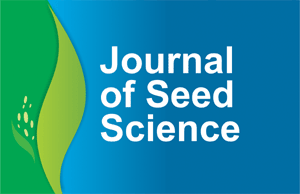Maize seeds infected by Stenocarpella macrospora can cause stalk and ear rot and leaf spot. Transmission of this pathogen through seeds may vary according to the cultivar, climatic conditions, and virulence of the pathogen among other factors. The aim of this study was to assess the transmission rate of S. macrospora from seeds of the maize cultivars C1-RB9308YG and C2-RB9108 using artificially infected seeds grown under two temperatures (20 ºC and 25 ºC). Seeds were inoculated by the osmotic conditioning method for 24 h (inoculum potential - P1), 48 h (P2), 72 h (P3) and 96 h (P4). After inoculation, 25 seeds were distributed individually in plastic cups with substrate, with 4 replicates per treatment. At the end of twenty-eight days of daily assessments, all plants were analyzed for the presence of the pathogen by biological methods, and some were sampled at random and analyzed Bio-PCR. The maximum percentages of dead seeds/seedlings in pre-emergence were 74.5% and 82.5% for P3 and P4, respectively. The highest total rate of transmission of the pathogen under study was 85.8% for seeds of the cultivar C1 at the highest inoculum potential (P4), grown at the temperature of 20 ºC.
seed pathology; inoculum potential; ear and stalk rot; fungus
